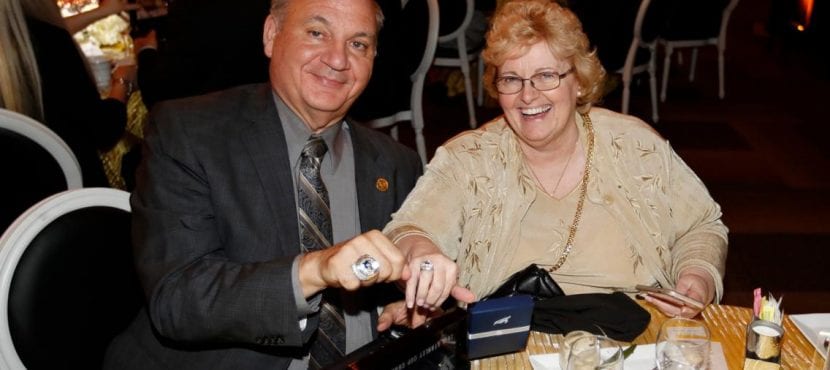The Pittsburgh Penguins’ business office will be a little less noisy in the future.
That’s because Dave Soltesz formally retired on June 30, after a distinguished twenty-four-year career as one of the organization’s senior executives.
“You always knew when Dave was making his daily stroll through the office at PPG Paints Arena, because he’d literally say hello to everyone he passed, and you could hear him coming down the hallway, his voice booming,” said Jason Seidling, the Penguins director of team services. “It was always, “Hi Jen! Terry, how you doin’? Sammy, nice story on the website!” It was part of daily life here. I’m going to miss that.”
Soltesz, 70, spent the first fourteen years of his Penguins tenure overseeing the team’s sales department, enduring the choppy waters of bankruptcy and the 2004 NHL lockout and rising to senior vice president of sales and marketing. In 2010, CEO David Morehouse named him the first president of the Pittsburgh Penguins Foundation, formally establishing the team’s legacy of community service and charitable giving, with an emphasis on the region’s youth.
Along the way, he contributed to three Stanley Cups.
“Dave is the epitome of a ‘Pittsburgh Guy’ – a straight talker who just gets things done,” Morehouse said. “Within 10 years he was able to make the Penguins Foundation a benchmark for all sports foundations, and put us near the top of the Pittsburgh community-targeted foundations. His strong background with our corporate partners helped create a great platform to work together on deeper community investment.”
A Pittsburgh native who graduated from Central Catholic High School, Soltesz had already established a successful business career by the time he joined the Penguins in 1996. He began his career in the supermarket industry and spent 11 years as vice president of sales and marketing for Supervalu before moving to J. Edward Connelly Associates as vice president of sales. But his ties with the hockey club reached back to the 1980s, when “a young marketing guy from the Penguins named Paul Steigerwald convinced me that this was an up-and-coming team and that Foodland should be a major partner,” Soltesz said. Part of that activation involved Foodland sponsoring the team’s 1991 Stanley Cup video (with a brief cameo of Soltesz himself cheering the team on from the stands, which brought relentless teasing from co-workers in later years).
The working connection eventually led to the Penguins offering Soltesz a job in 1996.
“We already had a strong sales and marketing relationship, and it was a time period when they were having some challenges with their corporate partners,” Soltesz said. “They approached me and explained that they were looking for someone to take over the position who could look at it from a customer’s point of view. It was a unique perspective, and it was interesting. So, I accepted.”
The early years of his 24-year ride weren’t without challenges of their own. The team declared Chapter 11 bankruptcy in September 1998, fell out of playoff contention in the early 2000s and was shut down during the NHL’s season-long lockout in 2004-05. The sales environment was leaner than ever, but Soltesz persevered. He negotiated an arena naming rights deal with Mellon during the bankruptcy, then built a valuable connection with YinzCam and struck foundational deals with numerous corporate partners.
“Mario’s ownership, Mario’s comeback as a player, Sid arriving, the Cup in 2009 … there are so many great memories from that era,” Soltesz said.
A new Penguins era began with the debut of a new arena in 2010. But it was also a time of transition in Soltesz’ career, as Morehouse tapped him to lead and organize the Pittsburgh Penguins Foundation from scratch. Up until that point, the team’s community outreach and charitable fund-raising had been done informally under the heading of community relations. “But Mr. Morehouse,” Soltesz said, “had a different vision.”
During his 10-year tenure as president of the Penguins Foundation, Soltesz helped to make it a charitable fund-raising powerhouse and spearheaded an astonishing range of initiatives on youth-based topics, from education to sports to health and well-being.
“From the mechanics side of creating a foundation my experience was limited, so I relied heavily on the Mario Lemieux Foundation for advice,” he said. “We built a foundation that was a tad non-traditional, leaning on my background in sales and marketing. We wanted to constantly challenge ourselves to be creative and innovative. We also had tremendous support from our owners, Mario and Ron Burkle, which made it all possible.”
“All you need to know about Dave is that his first idea to raise money was to take scrap steel from the old Mellon Arena roof and turn it into holiday ornaments that he sold as a fund-raiser,” Morehouse said. “The public loved it. They raised more than $2 million to fund many of the foundation’s core programs.”
Part of that process involved Soltesz “forging” a long-term relationship with Wendell August Forge of nearby Grove City, where artisans craft hand-wrought metalware and giftware. The original idea for Penguins holiday ornaments from the arena roof has expanded over the years to include team-themed coasters, knives, glasses, trays, bottle openers, cutting boards and other items (www.wendellaugust.com). Wendell August also created special items for player achievements, such as Sidney Crosby‘s 1,000th point.
“The one thing that was constant on each item and each partnership was Dave Soltesz,” said Christian Werner, president of Wendell August Forge. “Dave’s vision to revere history, open doors and create long-lasting partnerships – to benefit the community, and the kids in the Pittsburgh region – has been a core pillar for the Penguins Foundation. Dave is a catalyzer, a partner, a community leader, a family man and most of all a friend.”
Those and other dynamic fund-raising efforts have enabled the foundation to support a wide range of projects to benefit the region’s youth, including:
- Teaming with Highmark to build 15 dek rinks for local communities
- Joining forces with UPMC to create the Heads-UP baseline concussion testing program for young athletes in all sports
- Developing Lending Libraries to support education in 22 counties
- Creating the Cool Zone, an early intervention behavioral health evaluation program for children ages 3-12
- Maintaining a PensFit program that provides free floor hockey equipment to elementary schools.
- Providing millions of dollars of grants each year to support youth-based charities and programs.
“We refer to Dave as our Santa Claus,” said Rosanne Javorski, interim executive director of the Allegheny Intermediate Unit, a regional public education agency. “He has been a passionate advocate for education and models to his core the foundation’s belief that “Kids are the Future.’ Over the years, Dave has become part of our extended family at the AIU and has played a critical role in a variety of initiatives that provide resources and support to students and educators across the region. He has made a positive impact on the lives of thousands of children and educators.”
Soltesz’ fund-raising acumen led to other initiatives such as the foundation’s annual Night of Assists gala; a “Charity Bag Night” in conjunction with AT&T SportsNet, which also benefits the Mario Lemieux Foundation; and the 50-50 raffle at all Penguins home games at PPG Paints Arena.
He built a strong organization and staff along the way, and he leaves the foundation in excellent hands with Jim Britt as Executive Director and Amanda Susko as Senior Director of Foundation Programs and Strategic Planning.
Perhaps Soltesz’ biggest charitable supporter over the years has been Cindy Citrone of the Citrone 33 Foundation, one of the region’s leading philanthropists, and an ally on numerous promotions and projects, who will always remember him fondly.
“Dave was more than a partner – he was a mentor, a teacher and a visionary,” Citrone said. “He was the first to lead the way in identifying, creating and selling products that not only gave the fans a piece of the Penguins experience but created a sustainable revenue stream that funded numerous grants to the best non-profits in Pittsburgh. How he turned salvage roof material from the Civic Arena into an entire STEM education and tablet distribution program for public school students could be the second miracle on ice.
“In the 10 years that Dave served as president of the Penguins Foundation, he created and drove the organization to be the premier sports foundation not only in the city but in the world.”
Soltesz departs the Penguins with a lifetime of memories. Among the rewards were his personal days with the Stanley Cup in 2009, 2016 and 2017, which allowed him to share the hallowed piece of hockey history with wife Rosemary, children Deborah, Dave Jr. and Amy and eleven grandchildren – Dave III, Danny, Daphne, Grace, George, Sam, Bella, Matthew, Dominic, Jonathan and Drake. “Trying to get the Cup to nine different school buildings in three different counties between 8 a.m. and 3 p.m. was quite a challenge,” he said, “but it was big thrill to them, and I got to share it without about 4,500 kids each year.”
But his impact on his extended family in the Penguins business office was also profound.
“I was very fortunate to begin my career at the Penguins the same year as Dave Soltesz,” said James Santilli, the Penguins’ Senior Vice President of Marketing. “Dave has been a mentor to me. Without his vision, guidance, and friendship, I wouldn’t be in my position today.
“Dave challenged everyone, employees and partners alike, to think big. He wasn’t afraid to tell people, ‘That’s not good enough, you can do better.’ Over 24 years, it’s those challenges that helped drive the successes of the Penguins’ organization and the Penguins’ Foundation.”
Santilli, too, will always remember the “Soltesz stroll” around the office, greeting employees – a unique characteristic that will be missed.
“Early in my grocery career I had a manager that called it ‘Management by walk-around,'” Soltesz said. “I asked why, and he said, ‘First, it shows the staff that you have an interest in them personally and, secondly, it provides them with an opportunity to brag, vent or ask questions.’ It’s the best 15 minutes that you can spend, interacting that way. ‘How’s your kid doing in hockey? Let me see pictures? How’s your mom?’ It’s important to understand what is important to them and acknowledge their importance.
“The Penguins are the best because of the people, and I’ve always preached ‘Family First.’ I’ve been truly fortunate to have what I consider a second family that comprises everyone on this staff. It’s been an amazing experience for me with what I consider the best organization in professional sports.”








